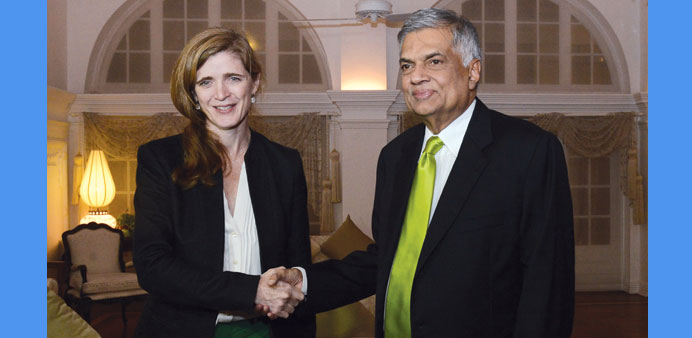Samantha Power shakes hands with Ranil Wickremasinghe in Colombo yesterday.
Agencies/Colombo
The US has underscored support for Sri Lanka’s efforts towards reconciliation, accountability and lasting peace in the aftermath of the three-decade civil war as its envoy to the UN visited the former war zone in Tamil-dominated Jaffna.
The US ambassador to the United Nations, Samantha Power, who is on a three-day visit to the country, appealed for support to the Sri Lankan government’s reconciliation efforts.
In a tweet, she said, “Urged Jaffna Chief Minister Wigneswaran to help reinforce #SriLanka precious moment for reconciliation/rebuilding.”
Power met with local government officials in Jaffna and organisations and communities affected by the conflict.
Wigneswaran told Power that he expects the US to bring pressure on the Sri Lankan government to further de-escalate the presence of the
military in the north.
The chief minister said that the large presence of the military has hampered the civilian life in the north.
Power was to meet President Maithripala Sirisena and Prime Minister Ranil Wickremesinghe
yesterday.
The US which moved three UN human Rights Council resolutions against Sri Lanka between 2012 and 2014 under Mahinda Rajapakse regime has supported the current government headed by Maithripala Sirisena.
Sirisena’s government has taken several steps to achieve reconciliation with the Tamil minority and the US has expressed support for such moves.
On Thursday, the government said it will launch special projects in the war-ravaged north to improve living conditions there.
Media Minister Gayantha Karunathilaka said in line with a proposal submitted to the cabinet by Minister of Rehabilitation and Resettlement D M Swaminathan, the government had approved implementation of 10 projects to upgrade the living status of these communities.
The projects are to be implemented for the families residing in more than six islands around the northern Jaffna peninsula, Xinhua news agency quoted Karunathilaka as saying.
The projects include upgrading the transport system in these areas for families to travel from the islands to the mainland.
Sri Lanka’s north was the worst affected in the 30-year civil war between government troops and the Tamil Tigers and was almost cut off for years from the rest of the country.
After the end of the conflict in May 2009 with the defeat of the Tigers, thousands of people were left
displaced in the north.
In June, government officials in the Northern Province called for private investments in many key areas including construction and healthcare in order to improve the conditions in the former war zone.

